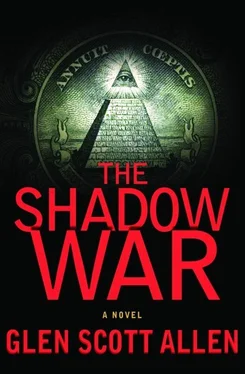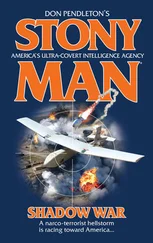Glen Allen - The shadow war
Здесь есть возможность читать онлайн «Glen Allen - The shadow war» весь текст электронной книги совершенно бесплатно (целиком полную версию без сокращений). В некоторых случаях можно слушать аудио, скачать через торрент в формате fb2 и присутствует краткое содержание. Жанр: Триллер, на английском языке. Описание произведения, (предисловие) а так же отзывы посетителей доступны на портале библиотеки ЛибКат.
- Название:The shadow war
- Автор:
- Жанр:
- Год:неизвестен
- ISBN:нет данных
- Рейтинг книги:5 / 5. Голосов: 1
-
Избранное:Добавить в избранное
- Отзывы:
-
Ваша оценка:
- 100
- 1
- 2
- 3
- 4
- 5
The shadow war: краткое содержание, описание и аннотация
Предлагаем к чтению аннотацию, описание, краткое содержание или предисловие (зависит от того, что написал сам автор книги «The shadow war»). Если вы не нашли необходимую информацию о книге — напишите в комментариях, мы постараемся отыскать её.
The shadow war — читать онлайн бесплатно полную книгу (весь текст) целиком
Ниже представлен текст книги, разбитый по страницам. Система сохранения места последней прочитанной страницы, позволяет с удобством читать онлайн бесплатно книгу «The shadow war», без необходимости каждый раз заново искать на чём Вы остановились. Поставьте закладку, и сможете в любой момент перейти на страницу, на которой закончили чтение.
Интервал:
Закладка:
Again Benjamin found himself struggling to explain his presence at the reception. He wished he and Natalya had established some sort of cover story. He decided again on a half-truth.
"I'm doing some research for the center," he said finally. "I was invited by a Ms. Natalya Orlova."
Nabil looked at him with a certain new appreciation. "A friend of Natalya's?" He smiled. "A very beautiful woman."
"Yes," said Benjamin. "She is that."
The waiters were already circulating with the next course, the golubzi. Benjamin tried his and found it again delicious.
"What sort?" asked Nabil.
"Excuse me?" asked Benjamin.
"What sort of research are you doing for the center?"
Benjamin realized he'd gotten himself into something of a trap, but then he also realized he had a rare opportunity to further his "research."
"This may sound a little presumptuous of me, Mr. Hassan," Benjamin began nervously, "but do you know anything about hieroglyphics?"
Nabil smiled very broadly. "That depends. What sort of hieroglyphics? Aztec? Asian? Polynesian?"
"Well, no, uh, that is…"
Nabil smiled. "I'm sorry, that's my little joke. Of course people always assume that only the ancient Egyptians used hieroglyphics for writing, when of course that is very much not the case."
"Of course," Benjamin said. "I'm sorry."
" Min fadila. Please, not at all," replied Nabil. "But I assume you were asking about my knowledge of Egyptian hieroglyphics?"
Benjamin nodded.
"Well, in that case, yes, I have passing knowledge, though I am far from a scholar on the subject."
"I'm not sure my question really requires a full-fledged scholar," Benjamin said. "In fact, I'm not even certain it concerns authentic Egyptian hieroglyphs. It could simply be a facile imitation, something with no real meaning."
"Well, Mr. Wainwright, why don't you describe to me the hieroglyph in question, and I'll try to ascertain its authenticity."
"All right." Benjamin looked around for something on which to write, finally simply pulled the cocktail napkin out from under his champagne glass. Then he realized he had no pen. Saying "Do you mind?" to the woman on his right, he extracted the tiny plastic sword from the orange slice in her emptied cocktail.
He put the napkin on the table and began tracing a symbol on it with the tip of the sword, pressing so as to make an impression.
"It looks something like this," he said. And as he drew he began to describe the symbol he'd seen in the mural in the manse and the portrait of Gates in the library. "A triangle, with an ellipse or an eye at the top, and-"
Nabil reached over and stopped his hand.
"Is this your little joke?" he asked. He was still smiling, but he sounded slightly insulted.
"I'm sorry?" Benjamin said.
"This 'Eye on the Pyramid' nonsense? I assure you, Mr. Wainwright, despite all your hysteria over this 'Pyramonster' in American movies and books, there simply was no such symbol in actual Egyptian hieroglyphs." He removed his hand from Benjamin's, sat back. "I'm sorry," he said, "but if I hear this gha 'bi mosh kowayes… this moronic…"
He paused, calmed himself.
"Forgive me." He patted Benjamin's hand. "Imagine listening to someone from Cairo ask you about the secret anti-Islamic message of, for instance, 'The Star Spangled Banner.' You would be amused and insulted, simultaneously, yes?" Benjamin nodded. Nabil sighed. "So it is with so much to do with our revered ancestors. In our country, they are almost holy. Like your Founding Fathers. But on your dollar bill, in your films, they become cartoons. You see?"
"Yes I do," Benjamin said.
Now the waiters were serving a baked sole. While Benjamin began picking at his, Nabil continued.
"And when it comes to pyramids, or triangles with eyes, well, they have as much meaning in Christian history as they do that of Egypt."
"How do you mean?" asked Benjamin, eager to keep Nabil talking.
"This eye you mention, this may be traced in Egypt to the Eye of Horus, which was all-knowing. And one can see how this developed. You see, here…"
Nabil extracted a pen from his pocket and, taking the napkin, drew four symbols on it:
"Here are the four Egyptian symbols for pyramid, the Egyptian word for which is mer. The first two symbols-the arc and the falcon-represent the light of the Pharaoh's soul as it ascends. But the pyramid itself is represented by the last two, the flattened ellipse and the triangle. Move the ellipse to the top of the triangle, turn it into an eye… you see? But this is also a symbol important to early Christians. The Eye of Horus becomes something like…" And then he sketched another symbol:
"In such Christian icons, the three sides of the triangle and the three rays coming from each side represent-"
"The Father, the Son, and the Holy Ghost," said Benjamin.
Nabil looked at him appreciatively. "Yes, exactly."
"And the eye in the center, later Christians called the 'All-Seeing Eye of God.' Or sometimes," and he watched Nabil's face as he said it, "simply the 'Eye of Providence'?"
Nabil nodded but displayed no other reaction. "Exactly so. You know your history."
"Some," said Benjamin. "But I understand what you mean about Masonic nonsense. The fact that it's on the Great Seal stirs up a lot of talk of conspiracies. People seem to forget, or don't know, that this part of the seal wasn't even designed by an American, but by a Frenchman, Pierre Eugene du Simitiere."
Nabil nodded. "If you wish to get truly conspiratorial, Mr. Wainwright, you might mention your own secret intelligence agency, DARPA."
"DARPA?" Benjamin asked. He had no idea what it meant.
Nabil smiled. "The Defense Advanced Research Projects Agency, of your Pentagon. They have something called the Information Awareness Office. Look at their icon sometime. It is a pyramid with a glowing eye at the top." He set the pen down, took up his wine, and tilted the glass toward Benjamin. "See what I mean? Everywhere cartoons."
Now Benjamin nodded. "But in this particular 'cartoon,' there is more than just the pyramid and eye." He held out his hand. "May I?" Nabil handed him the pen, and Benjamin continued with his own sketch.
"You see, beneath this circle or eye at the top of the triangle, there is a line. And then two more similar lines, like this, in each lower corner, to make smaller triangles. And inside both of those are these other lines, but with tiny legs at the bottom. And then between them, there's what looks like a snake…" But as he was attempting to draw a thick serpent, the pen's point tore through the thin napkin. He turned the napkin so Nabil could examine it.
"I see," said Nabil, looking down at his sketch. "Very interesting."
"So you've never seen anything like this?" Benjamin asked.
"Well." Nabil took another sip of his wine. "Not as a single Egyptian hieroglyph, no. But as a combination of different symbols…" He studied the sketch for a moment. "You see, these two 'lines with legs,' as you called them, in the bottom corners? These are the symbols for 'enemy.' And this serpent between them, this means 'conflict.' "
He was silent for a moment, thinking.
"Odd," he said finally. "Usually there is no barrier beneath the eye, as you have drawn it here. If there were no such barrier, I would say these were lines of power coming down from the eye. Or not power… more like control."
"Controlling what?"
"Why, the serpent of conflict, of course."
"Well, that line, or barrier as you call it, I am certain it was there, beneath the eye. Why, what could that mean?"
"I have never seen it done so. But were I to hazard an interpretation, I would say it suggested the power or control of the eye was hidden." He studied the sketch for another moment. "In which case, one would say this hidden agency was creating conflict between the two enemies, here in the corners. Provoking them, then sitting back in silence to watch their struggle."
Читать дальшеИнтервал:
Закладка:
Похожие книги на «The shadow war»
Представляем Вашему вниманию похожие книги на «The shadow war» списком для выбора. Мы отобрали схожую по названию и смыслу литературу в надежде предоставить читателям больше вариантов отыскать новые, интересные, ещё непрочитанные произведения.
Обсуждение, отзывы о книге «The shadow war» и просто собственные мнения читателей. Оставьте ваши комментарии, напишите, что Вы думаете о произведении, его смысле или главных героях. Укажите что конкретно понравилось, а что нет, и почему Вы так считаете.












